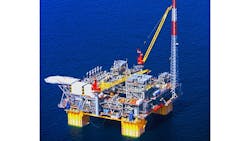LONDON -- BP (IW 1000/4) profits slumped in the third quarter on sliding oil prices and a drop in the ruble linked to Western sanctions against Russia, the British energy group said on Tuesday.
BP, which owns almost 20% of Russian oil major Rosneft, said that "depreciation of the ruble against the dollar over the period had a significant impact on" performance in Russia.
Oil prices have fallen sharply since the middle of June owing to a global supply glut, which prompted Goldman Sachs to say on Monday that it had slashed its price forecasts for the next two years.
BP chief executive Bob Dudley however said in Tuesday's results statement that despite "lower oil prices" and a plunge to quarterly profits, the oil major was "well on track" to hit its full-year targets.
Group net profit tumbled 63% to $1.29 billion in the three months to the end of September, compared with the outcome for the equivalent period in 2013.
Profit adjusted to reflect the value change in oil inventories retreated to $2.39 billion from $3.18 billion in the reporting period. Production fell 2.7% to 2.14 million barrels of oil equivalent, partly because of maintenance projects.
During the third quarter, BP learned that it potentially faces billions of dollars in new fines after a New Orleans judge concluded it had acted with "gross negligence" ahead of the massive 2010 Gulf of Mexico oil spill. BP reiterated in Tuesday's statement that it intends to appeal the ruling.
"The strength of sterling, the weakness of the oil price, the sanctions on Russia, coupled with the sharp drop of the ruble, and the ongoing uncertainty as to a final figure on the Gulf of Mexico settlement have all weighed on the company and may well have crushed a lesser force," said Richard Hunter, head of equities at Hargreaves Lansdown Stockbrokers.
"BP's response has been to generate strong cashflow, enabling an increase to the dividend and a continuation of the buyback program, a reduction in capital expenditure and an improved downstream performance, driven by an improved refining environment," Hunter added in a note to clients.
Russia's ruble has meanwhile been falling to all-time lows against the dollar and euro in recent weeks as the spillover from the Ukraine crisis and falling oil prices pummel the country's economy. On Tuesday, the ruble fell to new record lows of 54.04 to the euro and 42.50 to the dollar.
BP said on Tuesday that underlying net income earned from its stake in Rosneft slumped to $110 million in the third quarter from $808 million one year earlier.
Copyright Agence France-Presse, 2014
About the Author
Agence France-Presse
Copyright Agence France-Presse, 2002-2025. AFP text, photos, graphics and logos shall not be reproduced, published, broadcast, rewritten for broadcast or publication or redistributed directly or indirectly in any medium. AFP shall not be held liable for any delays, inaccuracies, errors or omissions in any AFP content, or for any actions taken in consequence.
